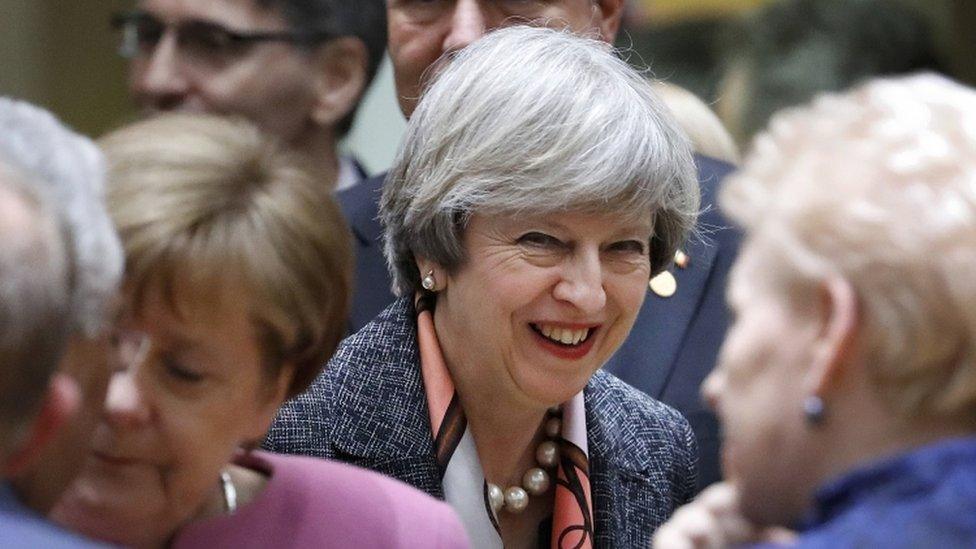Thatcher to inspire UK's Brexit 'divorce bill' talks?
- Published
Boris Johnson: Britain has an "illustrious precedent"
As Theresa May arrived at her last Brussels summit before pushing the button on Brexit, it is enough to give you a splitting headache.
Not just the complexity of actually getting a deal done, but the ceiling of the brand new European Council HQ in Brussels, decked out in a crazy patchwork of rainbow colours.
The architect told the BBC he hopes his design will lead to "joyful meetings" in a space "where politicians' deep talents can be expressed like poets".
Harsh words and hard bargaining are more likely to be a feature of the next two years despite the architect's dreams.
Even if there is goodwill on both sides, as British ministers increasingly hope, the technicalities of doing a deal are impossible to dismiss.

Brexit: Britain's Biggest Deal is on BBC Two from 21:00 GMT and is then available to watch on BBC iPlayer

First off there's an exit process to negotiate, with a likely exit bill of as much as £50bn.
Ministers have been careful so far not to say too much.
But Foreign Secretary Boris Johnson told me Britain has an "illustrious precedent" and should reject the demands - just as Margaret Thatcher did at the fabled summit in 1984, external when she wielded her handbag and didn't just ask for money back, she threatened to walk out if she didn't get her way.
He told me: "We have illustrious precedent in this matter... I think you can recall the 1984… summit in which Mrs Thatcher said she wanted her money back and I think that is exactly what we will, we will get."
A rather more provocative way of telling the rest of the EU that the contentious demands expected to be made just aren't going to happen and - by mentioning the Fontainbleu incident - implying at least that it is possible the UK could walk out over the cash.
That's before we start to untangle four decades when our countries, laws, rules and regulations have been becoming more and more enmeshed.
Then there are the prospects of getting a deal on the future of our relationships done.
What happens to security arrangements, information sharing, rules and regulations, our entire legal system, our future immigration system, fishing, farming, air traffic control, water quality rules, Europol, continent-wide arrest warrants? The list goes on and on.

Theresa May has arrived at her last Brussels summit before pushing the button on Brexit
Then, as our interview with Nicola Sturgeon makes plain, the constitutional implications at home are only starting to be understood.
There are fights too for powers in Northern Ireland with risks of destabilising the peace process, argues Tony Blair.
And if those two nations are fighting for more powers as control returns from Brussels, can Wales sit and just play along?
The hardest solutions to find though are on trade.
It's true that those who were ardent Remainers now in government say privately they are more hopeful.
A senior figure told me: "It's like a divorce. At the start you say, I hate you, I never want to see you again. Then you say, I still don't like you, but we need to talk about the kids."
There is no question that, in Westminster at least, the expectation is that individual members of the EU are softening their resistance.
That's why part of the UK government's strategy is unquestionably to divide and conquer.
But there isn't much sign of any softening, or at least anyone willing to say so in public.
'Money talks'
That's why, despite their optimism, there is a realism in government too, and they are preparing to think about having to walk away, with the Brexit Secretary David Davis admitting to me, he is very hopeful of "Plan A", but that ministers "have to do the work for the so-called Plan B or C".
He also reiterated the government's position that there is no way they will agree to a deal on EU citizens in Britain without agreement from the other side of the table.
He claims the "highest probability" is of getting a deal done.
For the many ministers and officials we've spoken to, they believe - for some of them it's more accurately a hope - that a good deal can be reached because in the end, money talks.
Just as Vote Leave argued, the belief at the highest levels of government is that whether it's German cars or Italian prosecco, European politicians will come willingly to an agreement because they rely on the buying power of the British consumer.
That is the argument that's continually cited and the ultimate irony.
Britain's politicians are relying on the EU to put economics before politics.
One of the reasons Britain chose to leave the EU is the perpetual frustration felt on our side of the Channel that continental politicians are incapable of doing just that.
It's a gamble perhaps that Theresa May didn't have much choice but to take.
But if she's wrong, the government, arguably the country, will need Mr Davis' Plan B. And the dreams of an architect might in fact be the start of a nightmare.